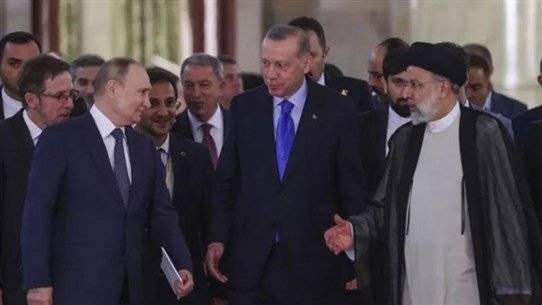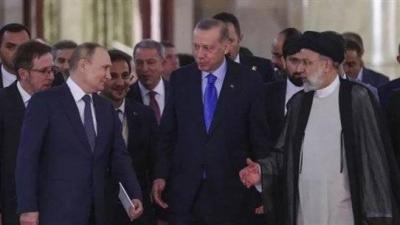The Syrian war that erupted in 2011 between the Syrian regime led by Bashar al-Assad and the armed opposition forces has transformed into a regional and international conflict. Several countries have supported different conflicting groups in Syria, each with its own political and strategic goals. Russia, Iran, and Turkey have all attempted to take advantage of the U.S. withdrawal from Syria to determine the course of the Syrian war according to their geopolitical aspirations.
During the presidency of Donald Trump, Washington isolated a key ally, the Syrian Democratic Forces (SDF), which played a crucial role in combating the Islamic State (ISIS). By abandoning the SDF, the U.S. provided Turkey with a valuable gift, prompting Ankara to increase its military activities in northern Syria and execute four military operations to limit the SDF's influence. Turkey is now awaiting the appropriate timing for a fifth operation in northern Syria to achieve new gains against the Kurdistan Workers' Party (PKK), with ongoing battles and confrontations resulting in approximately 40,000 deaths.
President Recep Tayyip Erdoğan's threat to undertake the fifth military operation aims to create a safe zone extending 30 kilometers from the Syrian-Turkish border, securing a breach into the Kurdish separatist areas. Erdoğan's recent participation in the trilateral summit discussing military developments in northern Syria alongside Russia and Iran aimed solely to obtain Russian and Iranian approval to carry out the desired operation. The Tehran summit was called by Russian President Vladimir Putin, who has been compelled by the war in Kyiv to shift his focus from Syria to Ukraine.
Amid the Ukrainian war and stalled Iranian nuclear negotiations, Turkey seeks to capitalize on the economic and political predicament facing Tehran and Moscow, potentially acting without their consent in northern Syria. Turkey is also reminding Russia and Iran of their unfulfilled political and military commitments, particularly in light of the repeated failures of the Astana talks and the inability of the three countries to agree on a unified roadmap while sidelining their interests.
Tensions have escalated among the three nations due to the lack of consensus on the Syrian file and the failure to establish secure zones in the country. Russia, Turkey, and Iran each have divergent and contradictory ambitions in Syria; while Turkey demands an end to Kurdish military operations in northern Syria and recalls the incident in Bilion that resulted in the deaths of 34 Turkish soldiers due to Russian airstrikes on their positions, Russia's support for Bashar al-Assad aims to reinforce its military foothold in Syria, providing it with advanced strategic positions in the Middle East. Meanwhile, Iran seeks to secure land corridors through Syria to supply its forces and allies, particularly Hezbollah, with military equipment—an essential leverage in its ongoing balance of terror with Israel.
All of this activity occurs while the Syrian regime remains sidelined from decision-making, and President Bashar al-Assad's absence from the Tehran summit underscores the regime’s lack of a role in determining the destiny and future of the country, having become hostage to regional settlements. Militarily, Turkey is fully prepared for the operation, benefiting from its NATO membership and its suspension of objections to Sweden and Finland's participation in the alliance to avoid Western opposition to the operation.
Turkey might use the threat of an operation in Syria as leverage to alter Finnish and Swedish behavior towards the Kurdish crisis in Turkey and halt their dealings with Kurdish groups opposed to Ankara. Therefore, Ankara could face minimal political opposition from NATO, Moscow, and Tehran if it chooses to execute its operations in Syria. Will Ankara proceed with the planned operation in northern Syria, or is it merely a threat used as leverage to gain approval for suppressing Kurdish groups that pose a threat to its security and stability?




